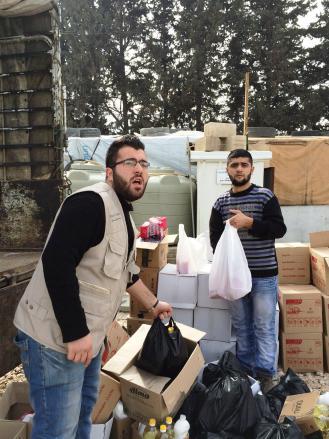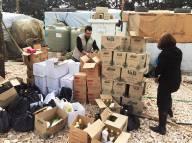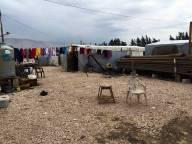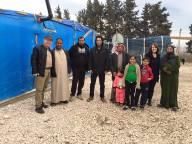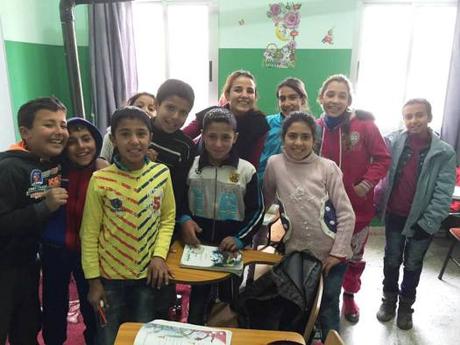We arrived in the Bekaa Valley and immediately felt the temperature change. It was cold and damp, the sun hidden behind a gray cloud. We entered a cold, concrete warehouse full of large, blue bags and boxes. This is where food and supplies are stored for refugees in the area. A truck was parked outside and volunteers were busy filling it with bags and boxes, all part of todays food distribution.
Inside the building we met Bashir, the director of Heart for Lebanon’s Bekaa Valley location. He explained to us that this is the hub for the 13 camps and thousands of refugees that they have committed to working with in the area. We would be going to visit a school and then head to a camp where we would be part of a regular food distribution. Along the way, we would meet and hear the stories of a few refugee families.
The school was a few miles away and up a gravel road. A mural on the outside, painted in primary colors, brought a bright splash of color to an otherwise bleak building. The inside was full of life and learning. The school principal explained that the school focused on the neediest kids, kids who were orphans or who had lost at least one parent in the Syrian conflict. There was room for 75 kids and he said parents are constantly pleading with them to accept their children. Many of the refugee kids have no opportunities to go to school and have now missed two to three years of critical learning.
We visited each classroom, watching dedicated teachers, some of them refugees themselves, focus on English, Arabic, and Mathematics. I longed to whisk some of the kids away and soak them in a hot tub for hours. It’s hard to keep clean with no running water, and kids around the world attract dirt like magnets attract metal.
Our next stop was on to a camp around fifteen minutes away. The camp had 165 tents and with an average of ten people per tent, hundreds of people. The food and supplies truck had already arrived and men were busy unloading. We received instructions: Each family would get one bag of food that contained sugar, tea, lentils, salt, rice and a few more basic supplies. Added to that we put three containers of oil, a bottle of dishwashing liquid, and soap into a bag. We got to work filling bags while the volunteers called a member of each family up to receive their allotment.
Most of the families from this camp came from farming communities in Syria. They are used to hard work, and life has never been easy for them. But refugee status had added a whole new level of ‘hard’ to their existence. Each family pays for the tents that they live in, $600 per year to use the land. The camp is isolated, apart from any stores or business hub. Men try to find work, but it is limited to informal arrangements as they don’t have legal status to work.
While the food distribution continued, we walked through the camp to visit a family. Taking off our shoes, we walked across the carpeted ground and sat on pillows set up around the sides of the tent. We asked the family their story. They were farmers in Syria near Aleppo — the family had 1500 olive trees that they tended and used as income generators. They lived simply, but the olive trees had been in the family for generations. With ISIS coming in and wreaking havoc, they fled to nearby Lebanon and had been at this camp for over 15 months. The olive trees were gone now, chopped up for firewood, no longer a living thing offering fruit and oil.
The extended family was large, and growing with a pregnant daughter-in-law as well as other family back in Syria.
Just one family. Just one story. But symbolic of so many more. Olive trees gone to waste, trees that had stood for generations helping a large farming family survive. Gone. Tragically cut down by people who care nothing for life. A family displaced, living in extreme cold and extreme heat in the Bekaa Valley of Lebanon.
We left the family, knowing we had so little to give. Now, a week after leaving Lebanon, I write this so I remember. So the pictures stay in my heart and mind a little while longer, so that I don’t forget. The rallying cry of these refugees is “Don’t forget. Don’t forget us. Remember us. Pray for us. Tell our stories.” And so I must.
We left the valley in late afternoon, going through a mountain pass where a thick fog blurred the valley below. I thought about a Psalm I memorized years before:
How blessed is the man whose strength is in You,
In whose heart are the highways to Zion!
Passing through the valley of Baca they make it a spring;
The early rain also covers it with blessings.
They go from strength to strength,
Every one of them appears before God in Zion.*
I look at the history of the verse and understand that historically this is a valley of weeping. And so these refugee tents full of people are scattered across this valley of weeping, this valley of tears. I can only pray that along with the tears is a God who sees and remembers, a God who will turn this valley into blessing.
*Psalm 84:5-7
Note: This week I hope to relay several stories from our time in Lebanon and Jordan. Thank you for your interest.
